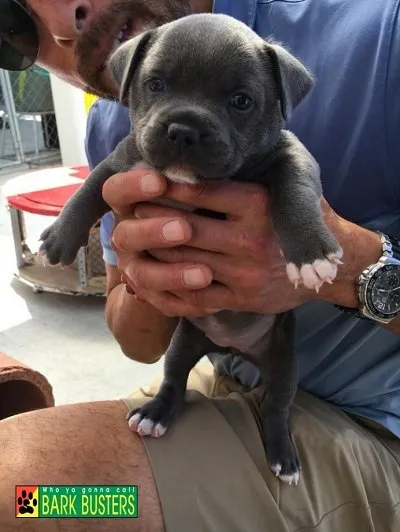Getting Your Puppy Comfortable With Being Handled

There will be many times during your puppy's life when someone other than you or your family will handle your pup physically in ways that may seem strange to them. At home, during quiet times, you can help your puppy become more comfortable with being handled in these different ways and the earlier you start, the more relaxed they will be when these situations actually occur. If you have young children please never allow them to constantly over handle a puppy, it is not a stuffed toy..
Veterinarian Examinations
Gently pat your puppy on different areas of their body while they are in a relaxed state. Mimic how the vet will examine your puppy - touch around their eyes and ears, gently hold their feet and toes, lift their lips and touch their teeth, hold your hand against their chest, gently move thier legs, etc. Take your time with this kind of touch, and do it often so that it becomes an agreeable experience for your pup both at home and at the vet. Teach them to sit and lie down while you are examining them; it will make your vet's job much easier if your pup is not squirming during their examinations.
Take your puppy to the vet clinic at times other than their appointments for vaccinations and checkups (you may want to call your vet's office first to make sure this is OK and find out when they are less busy). Swing by with them and put them on the scale, then ask the staff if they would like to pat them and/or give them a treat. This way, they will start to associate visiting the vet as a more positive experience.
Grooming
Start early with short sessions at home, using a brush well-suited to your puppy's type of coat and always brushing in the direction of the hair growth, working in sections. Be consistent, make the experience pleasurable and go slowly. Keep some treats in your non-brush hand to distract your puppy. Stop brushing when they seem more concerned with the brush than the treats.
Get your puppy used to the feeling of water by placing them in a bathtub or shower with a towel in it so they don't slip. After they seem comfortable, gently turn the warm water on and dab a little on their back with a washcloth. By taking it slowly, you will help them enjoy the grooming experience. Be careful not to use shampoos that may strip the natural oils of their coat.
Nail Clipping
To prepare your puppy for nail clipping, first let your puppy get used to the smell and sound of pet nail clippers and to having thier feet held; gently massage between their toes and nails. To start, just touch the clippers to your puppy's nail to see if they are comfortable with them. This may be enough for their first session.
Following the above steps, trim the smallest possible amount of nail, praising your puppy's calmness. You may need to distract them by holding a treat tightly in your hand while you clip; reward them with the treat when you are done. For some puppies, asking a friend or family member to hold or distract them may also be beneficial. If you opt to continue with do-it-yourself nail clipping, always make very small clips so as not to cut the nail's quick (the area where the nail's blood supply begins), which is difficult to see on dark nails. If you feel uncomfortable or unsure at all, stop, ask your vet to show you how - or take your dog to a professional.
Don't try to do all these activities in one session or by yourself. If your puppy is uncomfortable, just do one task at a time or ask for help from a trusted professional. Be sure to maintain a light and playful attitude; overly reassuring your puppy during the process may make them think there is a reason for them to become anxious. Respect any growls or defensive body language signs from your puppy, and always start with a call to your veterinarian if you suspect your dog is having an abnormal reaction to a situation that should not be causing them pain. Professional dog training will also help you establish a bond with your puppy as they grow in their trust of you and your relationship.
Please note that every puppy has different needs when it comes to physical handling; when in doubt, ask your veterinarian, groomer or trainer for advice or assistance.
Recent Articles
- How To Keep Your Dog Cool in the Summer Heat
- Keep Your Dog Safe This Summer: Bark Busters’ Essential Tips
- Christmas Dog Safety Tips: Keep Your Dog Safe & Happy This Festive Season
- Leash Training - How to Stop your Dog from Pulling on Walks
- Dog Aggression Training & Tips
- Halloween Safety Tips for Dog Owners
- Understanding and Training Dogs with Separation Anxiety
- Why Is My Dog Barking So Much? Understanding Excessive Barking and How To Help
- Dogs need education too!
- Winter woes? A dog-lover's guide to solving winter blues
